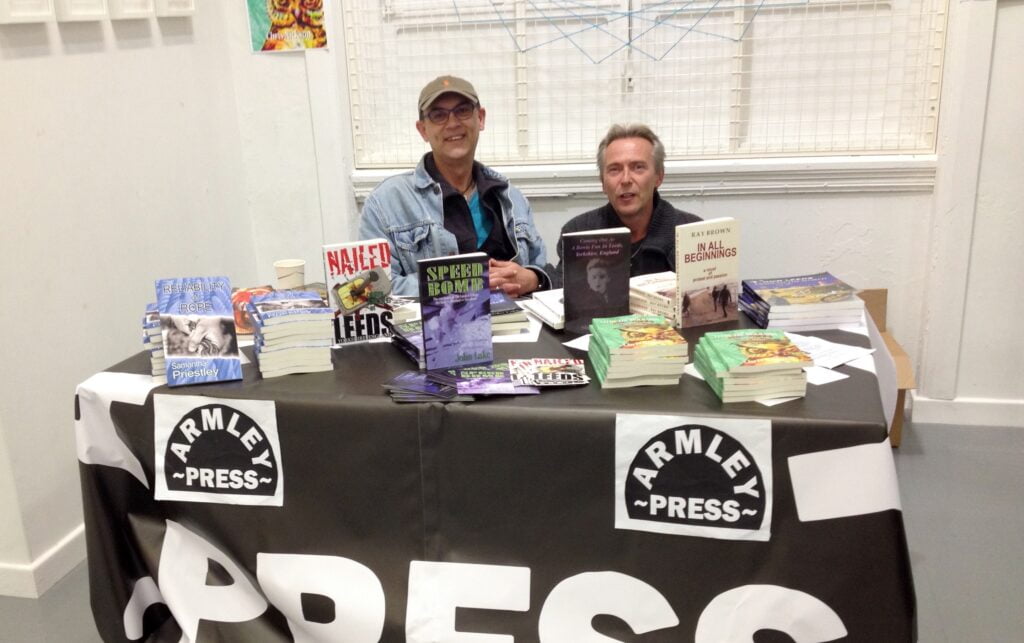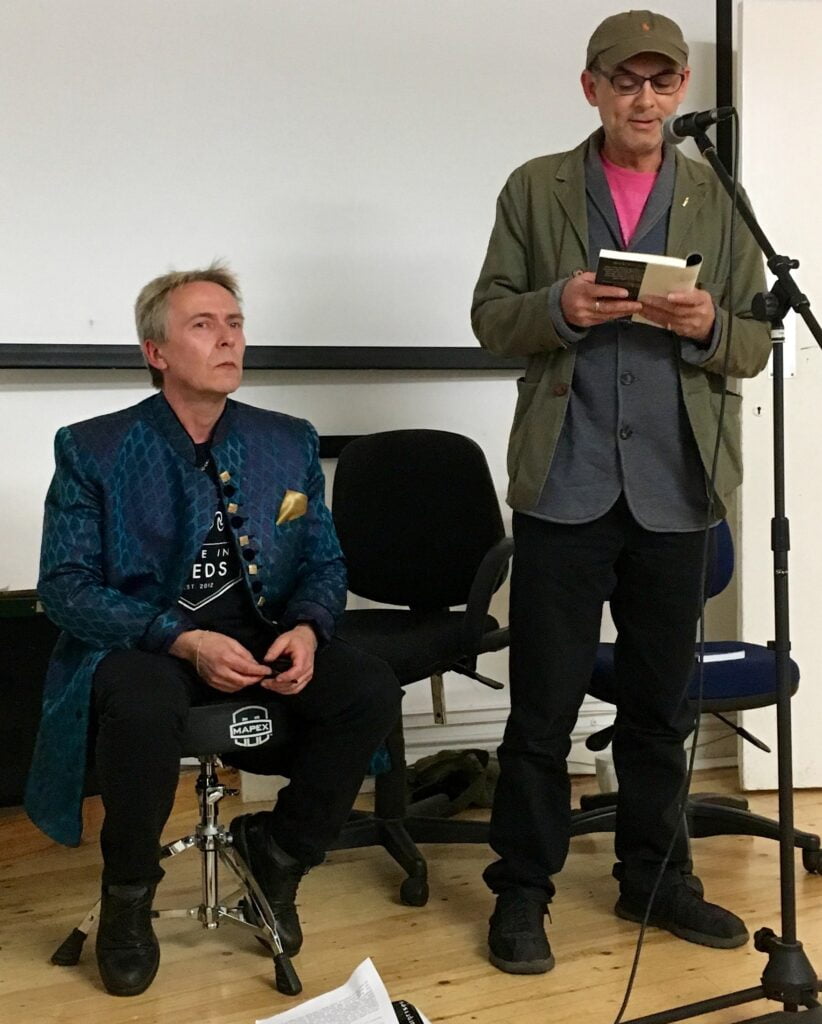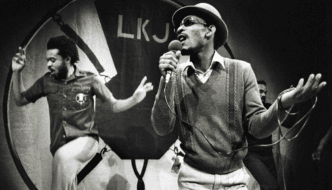 “Why would anyone want to read a sordid little story from a dirty Northern town?” was what a London agent said about ‘In All Beginnings’ a book Armley Press published in 2015. Armley Press was set up in 2006 by Mick McCann and John Lake out of a sense of frustration that so many high-quality Northern writers were failing to be published because they were excluded from the metropolitan bubble of London and the South East.
“Why would anyone want to read a sordid little story from a dirty Northern town?” was what a London agent said about ‘In All Beginnings’ a book Armley Press published in 2015. Armley Press was set up in 2006 by Mick McCann and John Lake out of a sense of frustration that so many high-quality Northern writers were failing to be published because they were excluded from the metropolitan bubble of London and the South East.
Mick McCann comments: “We felt that so many other voices were being drowned out because they didn’t fit the scrubbed clean model the London publishers liked. Everything sounded the same, there were no different voices. We wanted to publish things that broke out of that squeaky clean model, and by publishing different types of novels say that it was fine for prose to be dirty, and to have snot, shit and tears in it.”
John Lake had written his novel ‘Hot Knife’ and had a London agent for it. It was getting good responses, well established publishers would say things like “Some of our authors would kill their grandmothers to write dialogue that realistic” but they would always end on ‘It’s not for us’.
Mick McCann explains: ‘We set up the Armley Press for two reasons:
“Number 1. We felt that despite the quality of his book John wasn’t being published because he was too Northern, he wasn’t part of the London literary scene and didn’t have friends who wrote for the Guardian books section and The Times Literary Supplement.
Number 2. I’d written ‘Coming out as a Bowie Fan’. It was written with a sort of almost cocky teenage attitude, set in central and east Leeds and I wanted it published. I grew up in an almost working-class environment with the attitude of ‘People like me don’t write books’ and I wrote it for the hell of writing something, carving out something for myself amongst all the distractions of family life.”
“I’d sit up and write it for hours at a time late at night when my wife and kids had gone to bed”, he continues. “I felt that if John had written a really well crafted, well-structured book and couldn’t get that published, then I wouldn’t even bother sending it to agents.”
“John and I had known each other from years before. I’d done the whole traditional wife-and-kids thing. I’d settled down and stayed in Leeds, but John had travelled the world and was working at the School of African and Oriental Studies (SOAS) in London. We started Armley Press off when John was still in London before he and his wife retired back to Leeds.”
“We called it Armley Press for two reasons”, he explains. “First I was living in Armley and second because it wasn’t one of the places in Leeds, like Chapel Allerton, where you’d expect a publisher to be based.”
“With this sense of frustration at the safe literary world of London, in a sort of DIY punk attitude, I went ahead and published my novel myself through Armley Press. When I saw the sales figures for ‘Coming out as a Bowie Fan’ I didn’t think it had had a big response, I wanted to sell shit loads, I was thinking of it in terms of record sales, selling hundreds of thousands not just thousands.”
“But then one of John’s friends showed me some sales figures compared with short-listed Booker prize books, and to my amazement it had outsold some of them four times over.”
“Once I realised this it gave us the encouragement to publish more stuff and we put things out online, on Twitter and Facebook, saying we were looking for Northern authors.”

Mick continues: “We got a couple of books we wanted to publish but had no marketing budget. I approached it as: I want to flog some books, how do I promote them?”
“I was very good at blagging it, getting press coverage. I describe it as ‘guerrilla marketing’. I’d go on places like Amazon and comment on similar books and in doing so reference one of our own books. Or I’d go on websites about famous Leeds United football players and mention the book, or I’d go on lifestyle forum websites and Bowie websites and promote the book.”
“One of my jobs was selling medical CD-Roms in the early days of the internet so I understood about word searches. One of the reasons why I picked the title ‘Coming Out as a Bowie Fan’ was that I knew it had lots of key words like ‘Bowie’ and ‘Fan’ and ‘Coming out’ that would show up in internet searches.”
While Mick would do the business side of the press it was always John Lake who had the most say in what they published. The last book Armley Press published was ‘The Last Sane Man on Earth’ by Nathan O’Hagan. John describes the book as having a central character who rails against everything in a way that lots of us do, he feels a lot of the frustrations that lots of us have with the modern world but feel that we have to put up with.
“In a way he acts as a spokesperson for all the grievances we have but feel unable to air” is how John puts it. “The novel takes the idea of peaceful protests to a staggering extreme. In a way it is a blackly- comic novel about people who feel voiceless and are driven to extreme actions to make themselves heard.”
The next novel Armley Press is about to publish is ‘Whoosh!’ by Ray Brown. This is the second part of a trilogy of novels, written in the 80’s and set in Leeds. John describes how the novel is being published in part due to the demand of Ray Brown’s large base of friends and followers who want to read more of his work. Lots of them are older people who remember the miners’ strike, the subject of Ray’s first book, ‘In All Beginnings’.
“That novel was a social document of the miners’ strike, which was such a crucial time for Yorkshire” says John. ‘The next one, ‘Whoosh!’, deals with issues from an era that are still present in a lot of people’s minds. Especially in West and South Yorkshire where lots of the reading public still feel very strongly about what Thatcher did to the country and how her actions have shaped modern society.
“The novel portrays a crucial time in the transformation of the Labour Party and a major shift in economic policy to Reaganomics, and the embracing of new economic theory, ideologies that shaped the world we live in today. The book deals with the lives of people whose situations are affected by those changes when they were first introduced.”
Mick comments. “ The Armley Press never did make us any money. We have always had to subsidise it ourselves. That didn’t matter though, we never did it for the money, We’re both at the end of our careers now with nothing we need to prove, we only did it for the love of the thing.”
Filed under: Written & Spoken Word
Tagged with: Armley, authors, book, books, coming out, David Bowie, leeds, literature, London, marketing, North, northern, press, publisher, publishing, writers, writing



Comments